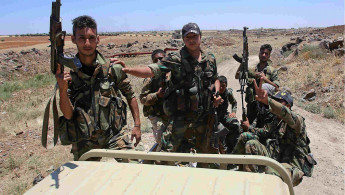Syrians flee fearing regime attack on IS in south: monitor
Thousands of Syrians have fled part of Daraa, fearing a regime attack on an IS affiliate who hold the area.
2 min read
Thousands have fled from Daraa (Getty)
Several thousand Syrians have fled parts of the country's south held by an affiliate of the Islamic State group due to fears of a government attack, a monitor said Monday.
The IS-held pocket in Daraa province's western countryside is not included in a ceasefire deal agreed last week between rebels and the regime's ally, Moscow.
That agreement put an end to more than two weeks of heavy bombing of rebel-controlled areas, but the Syrian Observatory for Human Rights said Monday that those living under an IS affiliate feared they were the next target.
"Around 4,000 people including hundreds of women and children fled areas controlled by Jaish Khaled bin Walid in western parts of Daraa, towards the border with the occupied Golan," the Britain-based monitor said.
The affiliate holds just under seven percent of Daraa province, according to Observatory chief Rami Abdel Rahman.
The regime's military advance and the handover of towns through the ceasefire deal has brought government forces to areas adjacent to the IS-controlled zone, Abdel Rahman told AFP, but no operation had begun.
Up to 200,000 displaced Syrians are already seeking safety along the border with the Israeli-occupied Golan Heights, according to David Swanson, spokesman for the UN's regional office working on Syria, which is based in Amman.
The waves of displacement caused by the Russian-backed government assault were the largest the south had seen since Syria's conflict erupted in 2011.
More than 320,000 people fled waves of Russian and Syrian air strikes, barrel bombs, and rocket fire, many of them to the sealed border with Jordan or west near the occupied Golan.
Tens of thousands of those displaced are already estimated to have returned home after the ceasefire brought relative calm to their hometowns.
More than 60,000 had taken shelter along the border with Jordan, but most have returned home and just 150-200 remained, according to the UN.
Under the deal, opposition fighters are to hand over their heavy weapons and the government will take over the province, including the border with Jordan.
The IS-held pocket in Daraa province's western countryside is not included in a ceasefire deal agreed last week between rebels and the regime's ally, Moscow.
That agreement put an end to more than two weeks of heavy bombing of rebel-controlled areas, but the Syrian Observatory for Human Rights said Monday that those living under an IS affiliate feared they were the next target.
"Around 4,000 people including hundreds of women and children fled areas controlled by Jaish Khaled bin Walid in western parts of Daraa, towards the border with the occupied Golan," the Britain-based monitor said.
The affiliate holds just under seven percent of Daraa province, according to Observatory chief Rami Abdel Rahman.
The regime's military advance and the handover of towns through the ceasefire deal has brought government forces to areas adjacent to the IS-controlled zone, Abdel Rahman told AFP, but no operation had begun.
Up to 200,000 displaced Syrians are already seeking safety along the border with the Israeli-occupied Golan Heights, according to David Swanson, spokesman for the UN's regional office working on Syria, which is based in Amman.
The waves of displacement caused by the Russian-backed government assault were the largest the south had seen since Syria's conflict erupted in 2011.
More than 320,000 people fled waves of Russian and Syrian air strikes, barrel bombs, and rocket fire, many of them to the sealed border with Jordan or west near the occupied Golan.
Tens of thousands of those displaced are already estimated to have returned home after the ceasefire brought relative calm to their hometowns.
More than 60,000 had taken shelter along the border with Jordan, but most have returned home and just 150-200 remained, according to the UN.
Under the deal, opposition fighters are to hand over their heavy weapons and the government will take over the province, including the border with Jordan.





 Follow the Middle East's top stories in English at The New Arab on Google News
Follow the Middle East's top stories in English at The New Arab on Google News
![Israeli forces ordered bombed Gaza's Jabalia, ordering residents to leave [Getty]](/sites/default/files/styles/image_330x185/public/2176418030.jpeg?h=a5f2f23a&itok=_YGZaP1z)

